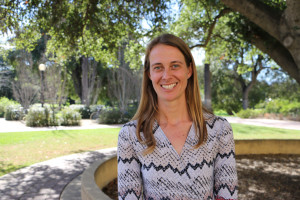This January, Stanford hired Alison Colwell to fill the new position of Director of Investment Responsibility Stakeholder Relations (IRSR).
The Board of Trustees created the IRSR last September to address issues of investment responsibility. Colwell’s appointment to lead the organization comes in the midst of growing controversy and student activism over fossil fuel divestment, spearheaded by the student group Fossil Free Stanford.
As director, Colwell acts as the central resource for all members of the Stanford community on the University’s investment decisions.
“The goal of that centralized point of contact… is to try to increase input from students or faculty or anyone in the Stanford community about investment responsibility, and also ideally to create dialogue,” Colwell said.
Colwell was drawn to Stanford because she believes the University is “a leader in having community input into processes.”
She cited the Advisory Panel on Investment Responsibility and Licensing (APIRL), a group of faculty, staff, students and alumni who review issues and make recommendations about socially responsible investing to the Board of Trustees. As Director of IRSR, Colwell supports the APIRL as well as the Special Committee of Investment Responsibility (SCIR), a committee on the Board of Trustees.
Currently, Colwell is focusing on assisting the APIRL with its request for a review on divestment from fossil fuels.

In the future, though, she hopes to be able to dedicate more of her time to broader community outreach.
“I hope when it’s not such an intense period that I’ll have a chance to look more at how… I plan on increasing dialogue,” Colwell said. “Well, first, I’ve got to go out out and listen to people and understand what they care about and how they want me to interact with them.”
Colwell hopes that she will be able to expand understanding of the existing structures for engaging with the APIRL. She also hopes to spread awareness beyond those groups taking action within the APIRL system.
A key part of this plan is the annual APIRL town hall to be held in spring quarter. The event invites all interested community members to come speak with the panel in person.
“The starting point is just making everyone aware that I am here… and that we have someone they can come talk to,” Colwell said.
ASSU President John-Lancaster Finley ’16 believes that the single point of contact Colwell provides marks a large step forward in facilitating dialogue on investment responsibility.
“I think that’s a really, really underrated kind of solution, when you can put one person in charge of one category of things,” Finley said.
“Now there’s one person who’s directly accountable to issues of investment accountability,” he added. “The more Stanford has specific people accountable to specific issues, the better.”
Like Colwell, Finley also emphasized a need to educate the community for informed decisions on investment.
He said that, although protests and rallies are helpful, other educational events are important as well to “[let] people know why it is they’re making this case to the university, what is it about the investments… that is so damaging and harmful.”
Finley believes that the University’s prior decisions to divest from coal and South African apartheid show that it is open to divestment, and that institutional mechanisms such as the APIRL are valuable avenues for conversation with the University.
“I think the question is, then, are students listened to during that [the divestment] process,” Finley said. “From what I’m hearing, it sounds like they’re making improvements so that students’ voices are heard.”
Sijo Smith ’18, a member of Fossil Free Stanford, agreed that the APIRL gives the Stanford community a rare ability to raise issues that are important to it.
“We feel very lucky because the APIRL is a kind of unique body,” she said. “Most schools, at least that I’m aware of, don’t have a system set up for that.”
Smith added that, even with the addition of Colwell, the APIRL may not be responsive enough to community concerns. She worried that the APIRL would continue to move slowly due to its nature as a volunteer body, citing high turnover rates during the last year as an issue that Colwell could not significantly influence.
Nonetheless, Smith believes that Colwell will help improve campus dialogue on investment.
“We’re really excited that [Colwell] is here… because historically it’s been really difficult to communicate with the APIRL,” she said.
According to Smith, much of the APIRL’s proceedings are confidential, leaving individuals that submit requests “in the dark of where they are in their process.”
Smith was enthusiastic about Colwell as an “in-between person” to ensure that students and the APIRL exchange information and answer each other’s questions.
Colwell hopes that over time she will be able to engage with the entire Stanford community about investment responsibility.
“What I’ve learned so far is that there are so many super bright, smart, dedicated people on campus,” Colwell said. “I think what I’ve learned compared to my old jobs, where I couldn’t do this so much, is to look within the Stanford community for ideas.”
Contact Regan Pecjak at reganp ‘at’ stanford.edu.
